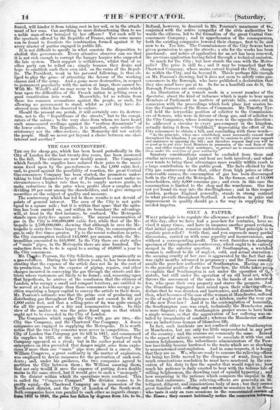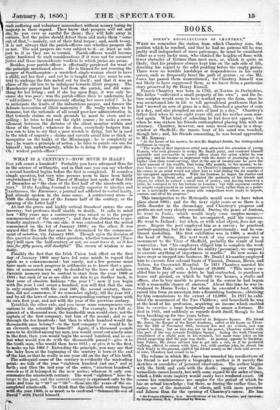ONLY A PAITPER.
WEST principle is to regulate the allowance of poor-relief ? Even at this day, after we have had a poor-law for centuries, have re- vised it many times, and have in suspense another grand revision, that initial question remains undetermined. What principle is to regulate poor-relief ? Settle that, and you supersede many partial discussions, carried on with some asperity and inconvenience, and without a corresponding profit. The week furnishes an alarming specimen of this superfluous controversy, which ought to be entirely merged in the anterior question. At Southampton, a wretched woman is suffered to die of neglect, cold, and actual starvation : the seeming cruelty of her case is aggravated by the fact that she was eight months advanced in pregnancy ; and the Times roundly assails the poor-law authorities of Southampton. Raving an aye to the general position of the new Poor-law, the Globe takes to explain that Southampton is not under the operation of t12a. statute, but still under the operation of an old local act, whiefil throws the assessment of the rates in the hands of an interested few, who spare their own property and starve the paupers. And the Guardians impugned turn round upon their relieving-officer,. declare that he was drunken and inattentive, and dismiss him. Bat then, what becomes of the case of the woman at Manchester, suffered to die of neglect on the flagstones of a kitchen, under the very eye of the new Poor-law? And if to the contemplation of humanity, the Southampton case was cruel, technically the Manchester case. is more flagrant; for the Southampton pauper seems to have been a single woman, so that the aggravation of her suffering was en- tailed by irregularity of conduct ; whereas the Manchester sufferer was an industrious woman of blameless life.
In fact, such incidents are not confined either to Southampton or Manchester, but are only too little unprecedented in any part of the country and the reasons are commonly the same. Inured to the aspect of misery, accustomed to associate it with vice and wanton helplessness, the subordinate administrators of the Poor- law inevitably become hardened to the traits which are so shocking to unaccustomed contemplation. And in some respects, it is happy that they are so. We, who are ready to censure the relieving-offieer for being too little moved by the eloquence of want, forget how much conscientious resolution he must have mustered in the exe- cution of his duty. to face the squalor that would repel us; how much his patience is daily exerted to bear with the tedious tale of willing helplessness, the drawling cant of squalid hypocrisy ; and how surprising is the patience which conquers the impulse to fly from that endurance. The relieving-officers are generally an in- telligent, diligent, and conscientious body of men ; but they cannot grow familiar with suffer* and remain so sensitive to it as those who taste it only on rare occasions in the concentrated essence of the Times; they cannot habitually notice the connexion betweesii ) such suffering and voluntary misconduct without misery losing its majesty in their regard. They know that paupers willrot and die, corners, lest teLerposocecare 0 police should dretectentliem aZ1I'make theema " come
outout of that,"—namely, out of their fatal torpor : and, sooth to say, it is not always that the parish-officers care whether paupers die or not. The said paupers are very subject to it—at least as sub- jeet to it as they are to vermin. Parish-officers would become quite hardened to such considerations if it were not for coroners' juries and those inconsiderate verdicts to which juries are prone.
Besides, your parish-officer is effectually perplexed for want of the principle mentioned above. He is blamed for not rescuing the pauper at Southampton—a wretched single woman about to have a child, not her first ; and yet he is taught that vice must be con- tent to undergo the fate meted out by itself ; and that it was an abuse of the old law to be indulgent towards illicit progeny. The Manchester pauper had her loaf from the parish, and did some- thing for her living ; and if she lay upon flags, it was only be- cause she was poor : was the parish-officer then to undermine her " self-reliance " by spontaneously offering her more relief ? Is he to anticipate the wants of the industrious pauper, and foresee the delicate necessities of illicit maternity ? He really wishes to be humane, but the rationale of all sound poor-law administration is, that towards claims on such grounds -he must be stern and re- pelling : he tries to find out the right course ; he seeks a recon- cilement between the dictates of the silent monitor within and those of the board ; whatever he does, everybody badgers him ; you rim to him to cry that a poor wretch is dying, but he is used to the trick of urgency ; claims and caveats assail him as thick as mosquitos on the banks of the Mississippi : he is completely at bay ; he wants a principle of action ; he tries to puzzle out one for himself ; but, unfortunately, while he is doing it the pauper dies. Oh ! wicked parish-officer !































 Previous page
Previous page